
views
Create a structured, consistent study plan.
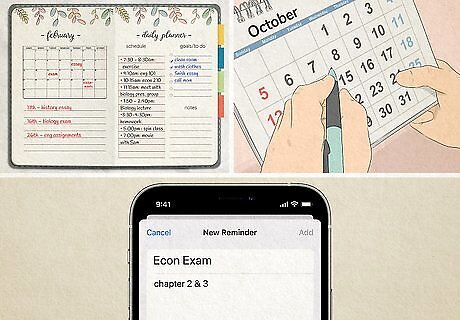
Plan out your study schedule on both a weekly and daily basis. Putting together a long-term study plan is an essential tool that helps you stay on top of your studies. Here are a few ways that you can get the most study potential out of each day: Phone alarms: Program an alarm or reminder for yourself so you remember when you’re supposed to study. Calendars: Mark any upcoming quiz or exam dates on a calendar. Then, schedule your future study session before these dates. To-do lists: Create a weekly or daily checklist to help you stay on top of your assignments and study obligations. This is a great way to stay focused on and on-topic during your study sessions. Reader Poll: We asked 390 wikiHow readers and 62% agreed that their preferred way to organize studying time is by making paper revision timetables. [Take Poll]
Find a productive place to study.

Work somewhere you can focus and be comfortable. If you're not studying well in your current location, you might be better off moving to a new spot. There’s nothing wrong with switching study spaces if you aren’t able to concentrate on your study materials or don't have what you need nearby. Some people may like the soothing background chatter of a coffee shop, while others may prefer a silent corner of the library. Test out different study spots and see what works best for you! Make sure that your desk is organized if you have one. Stack and organize any loose papers, and toss out or recycle anything you don’t need anymore. Try to keep all of your school supplies in designated places, too. Choose a study space that has good lighting as well as a comfortable place to sit.
Take an hour to review your classes each day.
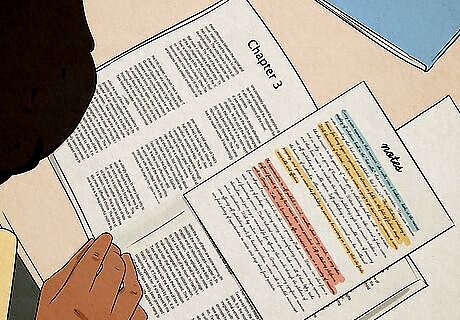
Long-term studying is better for your memory than cramming. Give yourself an hour or so to go through your notes, assignments, and any new material you learned throughout the day. Continue to review this new material throughout the week, so you have a better grasp of what you’re learning. This is a great way to stay on top of what you do and don’t understand. Feel free to ask a teacher or professor for help if something doesn’t make sense during one of your regular study sessions.
Break for 15 minutes once every hour.

Study in short sprints instead of long marathons. The longer you study, the less you’ll get out of your study session overall. Instead, step away from your study space for around 15 minutes so your brain can unwind and recharge. Here are some things you might do on your break: Head outside for a walk Munch on your favorite snack Pop on social media Watch a funny video
Cater your study sessions to your learning style.
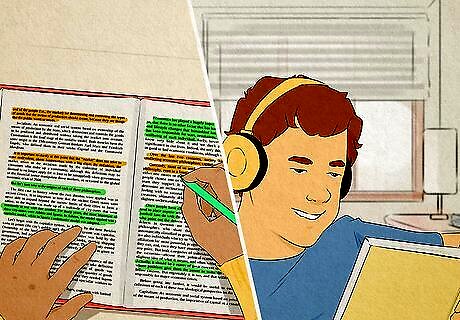
Many learners fall into 3 categories: auditory, visual, and kinesthetic. These groupings are fairly self-explanatory—auditory learners study by hearing information spoken out loud; visual learners study best with special visual cues; and kinesthetic learners prefer hands-on study techniques. Explore your learning style by testing out different types of studying strategies. Here are a few ideas to get you started: Visual: Create a color-coding system for your class notes and/or represent information with diagrams Auditory: Record and listen to yourself reading through your notes and/or chat about study topics with other students Kinesthetic: Act out a scenario with another person and/or craft physical models
Increase your understanding of the subject with visual aids.

You don’t have to be a visual learner to get a lot out of visual aids. In fact, many studies agree that visuals can help students better remember specific information. Try sprinkling some visuals into your study sessions when you’re trying to memorize and recall a lot of different terms at once. You might: Picture a container of disinfectant wipes while memorizing the word “antiseptic” Associate a picture of a mirror with the word “albedo” Connect the image of a white circle with the term “lymphocyte”
Memorize tough material with mnemonics.

Mnemonics are special acronyms that help you remember specific info. The acronym can represent a real word, or it can be complete gibberish—all that matters is that the mnemonic is something that you can easily memorize and recall later on. "ROYGBIV" is an example of a popular mnemonic to remember the colors of the rainbow: Red Orange Yellow Green Blue Indigo Violet
Incorporate multiple senses into your study sessions.

Reading alone isn’t enough to help you commit new info to memory. Instead, try reading your notes and study materials out loud as you study. This will make it a lot easier to memorize important concepts and information. You could also: Listen to a recording while reading the same material on the page Act out what you’re reading or memorizing
Transform your study sessions into mini exams.

Flashcards and practice quizzes are a great way to get started. Your main goal is to remember info on your own instead of relying on study materials to refresh your memory. Plus, this study technique makes it easier to recall important details on the days of your exams. Here are a few ways you get started: Jotting down the answer to a flashcard before turning it over Taking a practice quiz without any study materials nearby Brainstorming possible test questions and answering them yourself
Get the most out of your flashcards with a 5-box system.
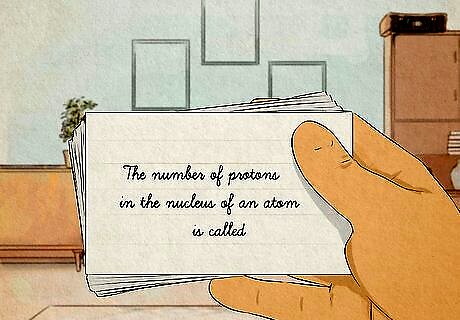
This system helps you prioritize the material that you’re struggling with. Set aside 5 boxes that are large enough to hold stacks of index cards. Start with all of your flashcards in the first box—if you get the flashcard right, move it to the second box. If you get it wrong, leave it in the first box. Over the next few days and weeks, go through each box and move a card to the right if you get it correct. Continue reviewing the different flashcard boxes until all of the cards stay in box 5. Here’s a helpful timeline that you can follow: Review the cards in box 1 every day Review the cards in box 2 every other day Review the cards in box 3 every 4 days Review the cards in box 4 every 9 days Review the cards in box 5 every 2 weeks If you forget the information on a specific card, move it to the previous box. For instance, if you answered a box 3 card incorrectly, you’d shift it over to box 2.
Teach the material to somebody else.

Teaching a topic forces you to have a really strong understanding of it. Ask a friend or study buddy if they’re willing to be your “student” for a few minutes. In that time, pretend that you’re teaching a class. Walk yourself through the topic as thoroughly as possible, filling the lesson with your own examples and definitions as you go. Feel free to reference your notes when you first start “teaching” a subject. With enough practice and focus, you’ll be able to remember the material without any extra help.
Set up a study group.

Study groups are a great way to remember that you’re not alone. Sure, that upcoming exam may seem pretty scary—but you’re in the same boat with all of your fellow classmates! Invite some of your peers to meet up outside of class and review the material that’s going to be on your exam. Invite fellow students that will stay focused and on-topic during your study session. You definitely don’t want to invite someone who will goof off the entire time.
Stay on-task during your study sessions.

Twitter, YouTube, and Instagram will still be there when you’re done studying. You’ll get more out of your session if you focus your complete attention on your study materials. A quick peek at your notifications can easily turn into a 20-minute detour away from your studies. Stay focused and put your devices away in the meantime. As a last resort, the AntiSocial app can help keep you focused. This app locks you of pre-specified websites for a certain amount of time so you aren’t tempted to surf the web.
Sleep instead of cramming before the test.

Cramming won’t do you any good if you’re too tired to remember the material. Instead, hit the hay at a reasonable time on the night before your big test. Ideally, try to get at least 7-8 hours of sleep so you feel refreshed, alert, and ready to tackle your big exam. If you can’t shake off your test-taking jitters, try: Only heading to bed when you feel tired Setting your thermostat to a cooler temperature Sticking to decaffeinated drinks in the afternoon and evening Soaking in the tub before bed
Skim through the exam before diving in.
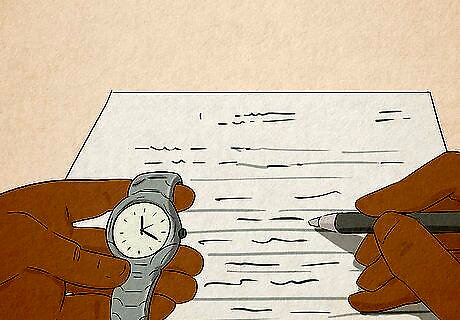
Budget your total exam time on different portions of the test. Certain exams might have different sections, like multiple-choice, true or false, essay writing, and more. Once the clock starts ticking, flip through your test and get an idea of what you need to get done. Then, make a mental schedule for yourself so you can stay on task and on track throughout the test. If you have 2 hours to take your English final, you might spend 30 minutes on multiple-choice questions, 15 minutes on true or false questions, and 1 hour on the essay. Then, you could use the last 15 minutes however you need.
Double-check your answers before handing anything in.
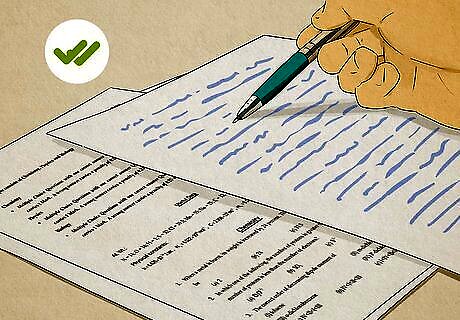
Check for any unanswered questions or small errors on your test. Make sure that you answered every question on the exam, and that you didn’t fill in or circle any incorrect options by mistake. If you have enough free time in the end, feel free to expand some of your long-answer responses.




















Comments
0 comment